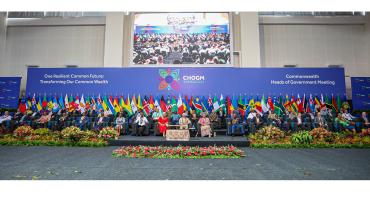Last week, millions of children and young people should have been returning to classrooms after the Easter break.

Last week, millions of children and young people should have been returning to classrooms after the Easter break.
But with more than half of the world’s population forced into lockdown to slow the spread of the deadly coronavirus pandemic, many are unable to even leave the confines of their homes.
The impact on education is a major concern for governments and institutions across the Commonwealth, many of whom have responded with measures such as online lessons, video-conference classes and the distribution of laptops to ensure everyone, including disadvantaged children, can keep learning.
The effect on access to education is not the only worrying consequence of the Covid-19 crisis.
For many children, attending school is not just an opportunity to learn, but their only chance to eat a hot meal. The School Feeding Programme is used across the world to protect some of the most vulnerable children, alleviating short-term hunger, improving nutrition and cognition of children and transferring income to families. In some poor households, it represents about 10 per cent of their monthly income.
Across the Commonwealth, we have great examples of school feeding programmes offering a lifeline for poor and marginalised children and those in remote areas. They provide free food grains, nutritionally balanced meals and innovations such as digital school meal planners.
The grave concern is that, despite these strategies, many children are missing out, particularly at a time when an increasing number of families are dealing with unemployment and income loss.
Worrying statistics
The World Food Programme estimates 368 million children across the world are currently not receiving school meals, up from 300 million in mid-March.
And, in the Commonwealth, more than 133 million children are thought to be missing out.
Alternative solutions
As governments battle with the unprecedented scale and impact of the crisis, we are seeing alternative solutions emerging that can be shared and replicated across the 54 member countries.
These include:
- Voucher schemes to support schools which are unable to use their usual suppliers, such as in-house and private catering teams, and local authority catering services;
- Arrangements to deliver food grains or cooked meals directly to the homes of beneficiaries;
- Depositing money directly into parents’ accounts during the period that schools remain closed;
- Using locally-sourced provisions, which can be easier to access and healthier than imported options; and
- Ensuring emergency programmes created in response to the coronavirus crisis include vulnerable school children and their families.
What have we learnt?
As we continue to create strategies to protect and improve school feeding programmes during the Covid-19 pandemic, here are some points to consider:
- Studies show the strongest and most sustainable programmes are those that respond to a community’s needs, are locally owned and incorporate some form of parental or community involvement.
- Engaging communities is important in securing transparency, accountability and effective implementation. So, programmes should bring in different degrees of community involvement, covering both cash and in-kind contributions.
- School feeding programmes provide an entry point to reach households in the wider community through campaigns for improving hygiene, health and nutrition practices at the household level. A nutrition and healthy consumption practices campaign should be included in the preparedness and response approaches to the pandemic.
- It is important to ensure the benefits of programmes reach poor and vulnerable children, including orphans who were already food insecure before the crisis impacted incomes.
- With many governments likely to suffer budgetary constraints, targeting the needs of disadvantaged and vulnerable children requires setting clear criteria and practical guidelines.
- The efficiency and effectiveness of feeding programmes will depend on how well programme designs and implementation are tailored to countries’ specific systems and resources.
- We need a multisectoral approach to school feeding. The success of programmes is dependent on collective effort and partnership, including working with the private sector, and alongside the health sector’s efforts to avert disease spread.
A rough situation
Without school meals, millions of children will become susceptible to malnutrition and other health risks as their immunity diminishes. Effective school feeding programmes also provide indirect benefits to communities, such as employment opportunities in school kitchens, increased income and skill acquisition opportunities for smallholder farmers, and complementary school feeding activities such as community nutrition volunteers.
These factors should be considered given that the pandemic has had negative impacts on food security, especially for vulnerable populations including children, women, the elderly and the poor. Experience from previous health crises, such as the Ebola virus outbreak in Guinea, Liberia and Sierra Leone in 2014 when rice and cassava prices skyrocketed by 30 and 150 per cent respectively, indicates that many countries are exposed to the risk of rising domestic food prices.
Sustainable healthy diets that contain sufficient fruits and vegetables are crucial in protecting people’s immunity. This is a particular concern for those already at risk of, or suffering from food insecurity, such as the 23 African countries severely impacted by the current locust plague.
Food insecurity may lead vulnerable households to resort to negative coping mechanisms that include reduced number of meals, increased school drop-out rates, inability to cover health expenditures, gender-based violence, selling of productive assets and child labour.
It is critical that we work to protect our school feeding programmes during the coronavirus crisis, by collaborating across borders and sectors and sharing information, ideas and solutions.



